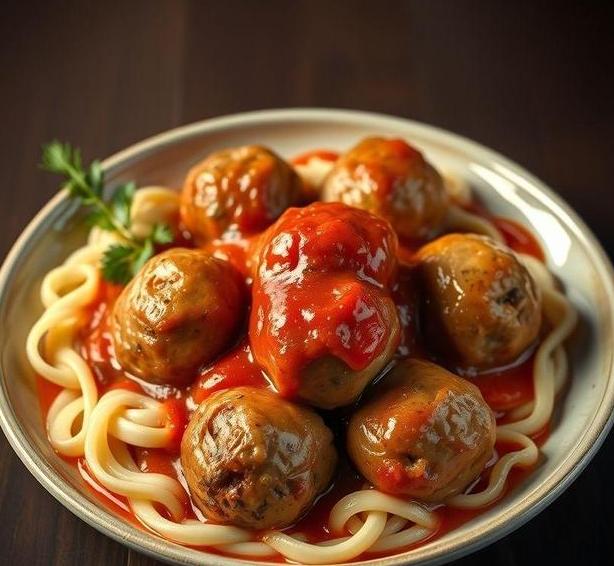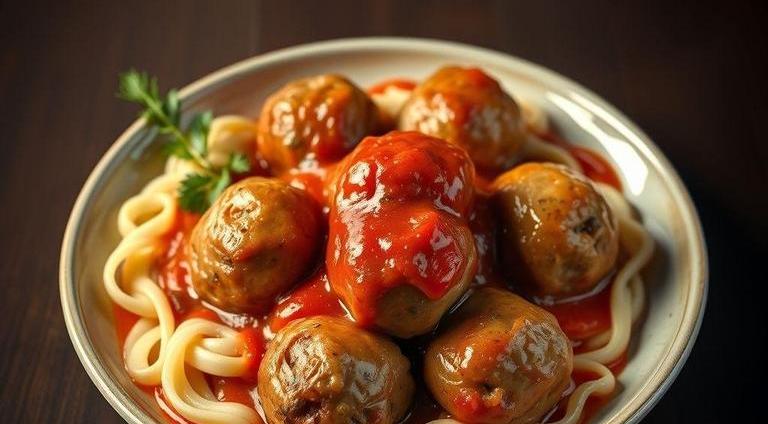If you’ve ever made a large batch of meatballs, whether it’s for a family dinner, a party, or just for meal prep, you know the joys of having leftovers. But the question often arises: How long can you safely keep those cooked meatballs and sauce? Can they go bad? What’s the best way to store them to keep them fresh, and how can you tell if they’ve spoiled?
In this guide, we’re going to break it all down, from the shelf life of cooked meatballs and sauce, to expert storage tips, to common signs of spoilage that you should watch out for. By the end, you’ll feel confident in your ability to store and safely enjoy your meatballs and sauce days or even weeks after cooking them.
Can Cooked Meatballs And Sauce Go Bad?
Yes, cooked meatballs and sauce can go bad. Just like any other cooked food, if they’re not stored properly or kept for too long, they become a breeding ground for bacteria. While meatballs themselves are a hearty, protein-rich dish, and sauce provides moisture to keep them tender, both are perishable, and improper storage can lead to foodborne illnesses.
Here are a few key things to remember:
- Meat is a high-risk food: Because meatballs contain ground beef, pork, or poultry (or a combination), they are prone to bacterial growth if left at room temperature for too long.
- Sauce is a breeding ground: Sauces often contain tomatoes, cream, or other ingredients that can also spoil if not handled and stored correctly.
- Risk factors: The way the meatballs were cooked, the temperature at which they were stored, and how long they’ve been in the fridge or freezer all affect whether they go bad.
Shelf Life For Cooked Meatballs And Sauce

How long do you have before your delicious meatballs and sauce are no longer safe to eat? It depends on how you store them, but in general, here’s a breakdown of shelf life:
-
In The Fridge
- Cooked meatballs and sauce can last anywhere from 3 to 4 days in the refrigerator. This is assuming they’ve been stored properly in an airtight container. After this time, you should be cautious, as the risk of spoilage increases.
-
In The Freezer
- Freezing meatballs and sauce is a great way to extend their life. Frozen meatballs and sauce can last up to 3 months. While they might still be safe after 3 months, the quality may decline, especially the texture of the meatballs and the sauce’s consistency.
-
At Room Temperature
- Cooked meatballs and sauce should not be left at room temperature for more than 2 hours (or 1 hour if it’s particularly hot out, above 90°F / 32°C). After that, bacteria multiply rapidly, making it unsafe to consume.
Common Signs Of Spoilage
Knowing how to identify when your cooked meatballs and sauce have gone bad is crucial for food safety. Here are the common signs you should watch out for:
-
Smell
- If your meatballs or sauce develop an off or sour smell, it’s a strong indicator that they’ve spoiled. Fresh meatballs should have a savory, meaty aroma. Sauce, depending on the type, should smell tangy or herby, not rancid or overly acidic.
-
Color
- Meatballs that have turned from their usual reddish-brown or golden color to a dull grey or greenish tint are likely no longer safe to eat. Sauces that look discolored (for example, a tomato-based sauce that turns brownish or watery) may also be a sign of spoilage.
-
Texture
- If the meatballs have become overly slimy or mushy, or if the sauce has separated in an unusual way (like curdling if it’s a cream-based sauce), it could indicate bacterial growth or spoilage.
-
Taste
- If you notice a bitter, overly sour, or rancid flavor, that’s a clear sign that your meatballs and sauce are no longer good. Trust your taste buds; if it tastes off, don’t risk it.
-
Mold
- Mold growth is a no-brainer sign that your food is unsafe. Any presence of green or black mold on the meatballs or sauce means they’ve gone bad and should be thrown out immediately.
How To Store Cooked Meatballs And Sauce?

Proper storage is the key to extending the life of your cooked meatballs and sauce and keeping them safe to eat. Here’s how to do it right:
Cool It Down Before Storing
- Never store hot meatballs and sauce straight from the stove. Allow them to cool down to room temperature before placing them in storage containers. Storing hot food can cause condensation inside containers, which can lead to sogginess and faster spoilage.
Use Airtight Containers
- Whether you’re storing your meatballs and sauce in the fridge or freezer, always use airtight containers to keep out air and moisture. This helps prevent freezer burn and keeps your food fresh longer.
Separate Sauce And Meatballs (Optional)
- If you prefer your meatballs and sauce to stay separate, store them in different containers. This can prevent the meatballs from becoming soggy and allows you to defrost or reheat each part individually as needed.
Label And Date
- When storing food in the fridge or freezer, it’s a good idea to label and date the containers. This way, you’ll easily know how long the food has been stored and avoid keeping it for too long.
Store In The Right Place
- In the fridge: Place your container on the middle or lower shelves, where the temperature stays the most consistent.
- In the freezer: If freezing, make sure the meatballs and sauce are fully cooled before placing them in the freezer, and ensure they are stored flat for easy stacking.
Expert Tips
To maximize the shelf life of your cooked meatballs and sauce and ensure they stay as fresh as possible, here are a few expert tips:
- Double-wrap for the freezer: If you’re freezing meatballs and sauce, wrap them tightly in plastic wrap or aluminum foil before placing them in a freezer-safe container. This double layer of protection helps prevent freezer burn.
- Portion control: Consider dividing your meatballs and sauce into smaller portions before storing them. This makes it easier to thaw only what you need, reducing waste.
- Freeze them in sauce: For extra flavor and moisture retention, freeze your meatballs in the sauce. This can help the meatballs maintain their texture and absorb more flavor when reheated.
- Reheat carefully: When reheating your meatballs and sauce, do so slowly over low heat to prevent them from drying out. Stir occasionally to make sure everything is heated evenly. If they’ve been frozen, it’s best to thaw them in the fridge overnight before reheating.
- Use quality ingredients: Fresh meat and good-quality sauce will store better and last longer. Always choose fresh ingredients when making meatballs and sauce, as they will inherently spoil less quickly than food that was already nearing its expiration date when cooked.
FAQs
How Long Can Cooked Meatballs And Sauce Last In The Refrigerator?
Cooked meatballs and sauce can typically last in the refrigerator for 3 to 4 days when stored properly in an airtight container.
Can Cooked Meatballs And Sauce Be Frozen?
Yes, cooked meatballs and sauce can be frozen. Store them in an airtight container or freezer-safe bag for up to 3 months for optimal quality.
How Can You Tell If Cooked Meatballs And Sauce Have Gone Bad?
Signs that cooked meatballs and sauce have gone bad include an off smell, mold growth, or a change in color or texture. If they have a sour or rancid odor, they should be discarded.
Can Cooked Meatballs And Sauce Be Stored Together?
Yes, cooked meatballs and sauce can be stored together in the same container. This can help retain moisture and flavor, but be sure they are cooled to room temperature before refrigerating.
What Is The Best Way To Store Cooked Meatballs And Sauce To Prevent Them From Going Bad?
The best way to store cooked meatballs and sauce is by placing them in an airtight container after they have cooled. Ensure the container is sealed tightly to minimize exposure to air, which can cause spoilage.
Can Cooked Meatballs And Sauce Spoil At Room Temperature?
Yes, cooked meatballs and sauce can spoil at room temperature. The USDA recommends not leaving cooked food out for more than 2 hours, or 1 hour if the room temperature is above 90°F (32°C), as bacteria can grow rapidly.
How Long Can Cooked Meatballs And Sauce Sit Out Before They Go Bad?
Cooked meatballs and sauce should not sit out at room temperature for more than 2 hours. If the temperature is above 90°F (32°C), this time reduces to just 1 hour.
Is It Safe To Eat Cooked Meatballs And Sauce After 4 Days In The Fridge?
While it may still be safe to eat cooked meatballs and sauce after 4 days in the fridge, their quality might decline. Always check for signs of spoilage, such as changes in smell or texture, before consuming.
Can You Reheat Cooked Meatballs And Sauce More Than Once?
It is generally safe to reheat cooked meatballs and sauce once. However, reheating multiple times can degrade the texture and flavor. Be sure to heat thoroughly to 165°F (74°C) to ensure food safety.
What Should You Do If You Accidentally Left Cooked Meatballs And Sauce Out Overnight?
If cooked meatballs and sauce were left out overnight, it is best to discard them. Bacteria can multiply rapidly at room temperature, and consuming food that has been improperly stored can lead to foodborne illness.